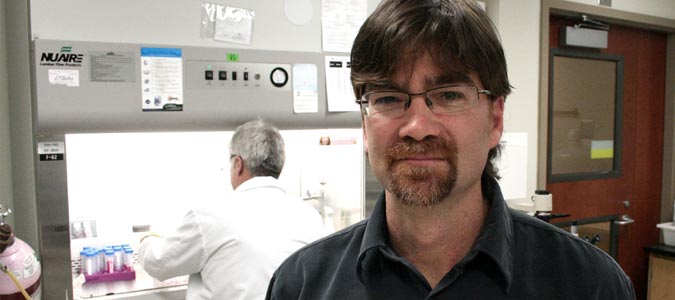Tackling drug-resistant cancer
Using chemotherapy to kill breast cancer cells is one thing; eradicating drug-resistant cells is a whole other challenge, but one U of S researcher in the College of Medicine thinks he is onto a treatment protocol that holds exciting potential for those with breast cancer and other forms of cancer as well.
By Colleen MacPherson In the lab of Troy Harkness, associate professor in the Department of Anatomy and Cell Biology, research into combining chemo drugs with an unexpected partner—a drug commonly used to treat diabetes—is showing positive results in killing drug-resistant cancer cells. It is work that the Canadian Breast Cancer Foundation (CBCF) has recognized and will fund for the next three years.
In the lab of Troy Harkness, associate professor in the Department of Anatomy and Cell Biology, research into combining chemo drugs with an unexpected partner—a drug commonly used to treat diabetes—is showing positive results in killing drug-resistant cancer cells. It is work that the Canadian Breast Cancer Foundation (CBCF) has recognized and will fund for the next three years.
Explaining his work in the simplest possible terms, Harkness said the key seems to be in restoring the health of the cell's chromosomes, which then allows the cell to either repair itself or destroy itself rather than continue to replicate as a cancer cell. "That's the hypothesis we're working on."
His work in this area goes back a number of years to Harkness using chemotherapy treatment on cells to observe the development of drug resistance. "We would treat the cells with a low-dose drug which would kill most of them, but there were some that weren't killed. We'd ramp up the dose and watch what happened to those cells. Many survived quite nicely and would become resistant to other drugs as well." Harkness suspected damage to chromosomes "created the opportunity for drug resistance. The question we asked was whether reversing that damage would help kill drug-resistant cells."
During those studies, data from other labs appeared indicating people being treated for type 2 diabetes display a reduced incidence of some cancers. Harkness introduced a common anti-diabetic drug along with the chemotherapy drugs and the results were exciting—this co-treatment protocol killed the drug-resistant cancer cells. The anti-diabetic drug appeared to improve the health of the chromosomes, reduce the cell's defences and allow the chemo drug to do its work, all without damaging healthy cells.
Expanding his work to drug-resistant human leukemia and breast cancer cells, and rat brain cancer cells, Harkness got the same results. "We wondered if there is an effective way to treat all drug-resistant cancer cells," he said.
With $125,000 a year for the next three years from the CBCF, Harkness' lab will continue to explore how anti-diabetic drugs protect patients from multiple drug-resistant breast cancer, and possibly drug-resistant cells in all forms of cancer. "In three years, we expect to have a pretty good idea of what the drugs are doing to chromosomes to help the cell behave better, and to understand the pathways within the cells that mediate this protective mechanism. It's information that will help clinicians and other researchers make more informed choices about treatment."
Asked about elevating his research to animal trials, Harkness admitted it is not his area of specialty—"my best approach is to collaborate," adding a research group in Singapore is interested in applying his drug protocol to mice.
Harkness is modest about the significance of his work. "It's small steps, and this is a long-term investment. There's still so much to learn about the cell, even in its healthy state. People thought we'd have all the answers when they mapped the human genome but that just created another level of complexity. Every time you think you've got something solved, you open another door and ‘Oh oh, no you don't.'
"Once you start to see how a cell works, all the moving parts, you see how many things can go wrong. Any one of those things can cause the cell to grow out of control, and that's cancer."
While the number of questions yet to be answered about the cell may be daunting, Harkness said every day in the lab is exciting. "This is what we love to do," adding that everyone in his lab—research associates, research assistants, grad students, even the computer experts who crunch his research data—recognize "that finding a cure for cancer is going to take a long time and is beyond the capabilities of a single lab." It's about many small steps adding up to significant progress, and about bringing hope to cancer sufferers "by them knowing that someone out there is working on this."

